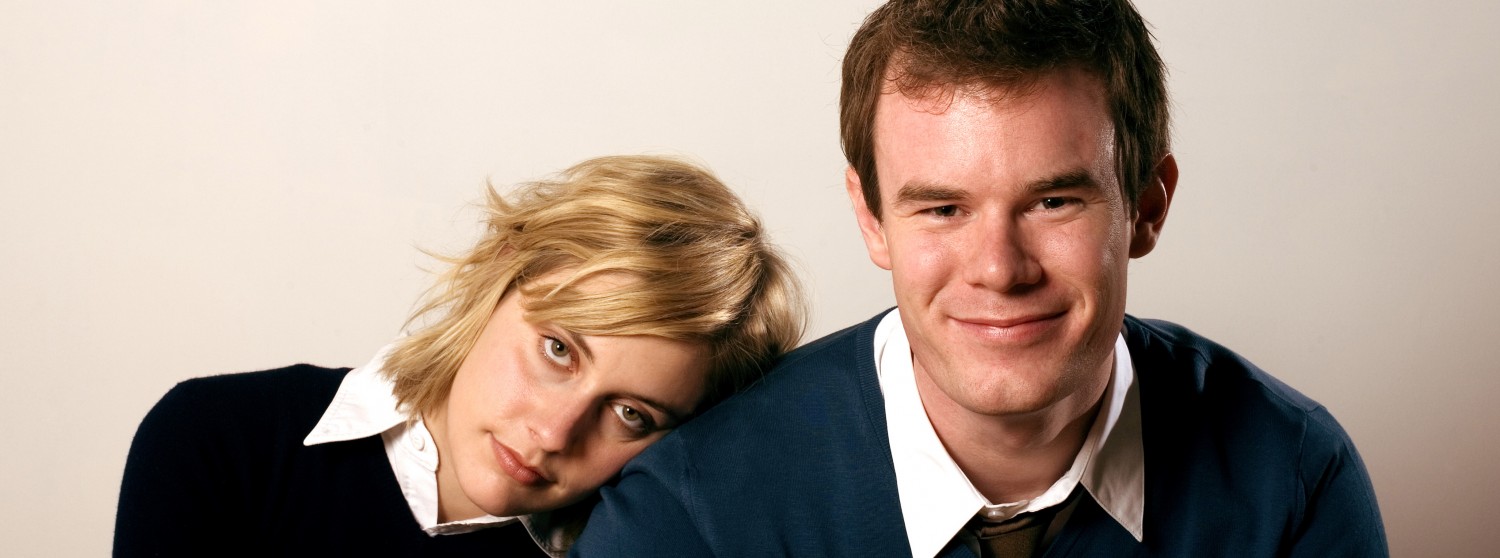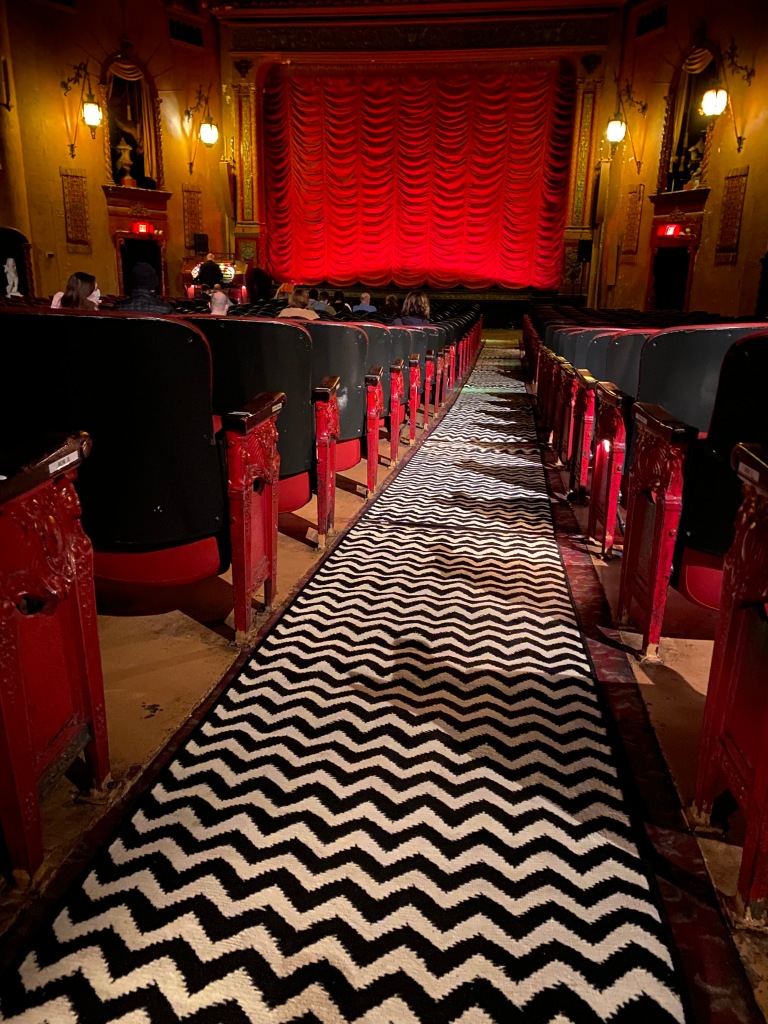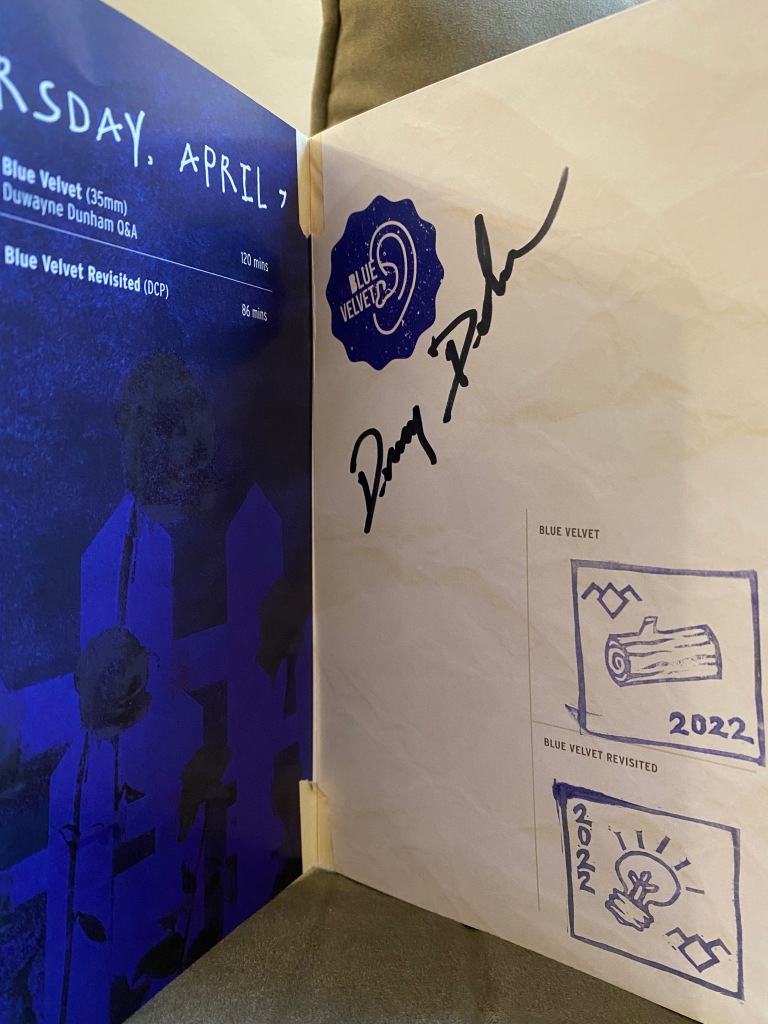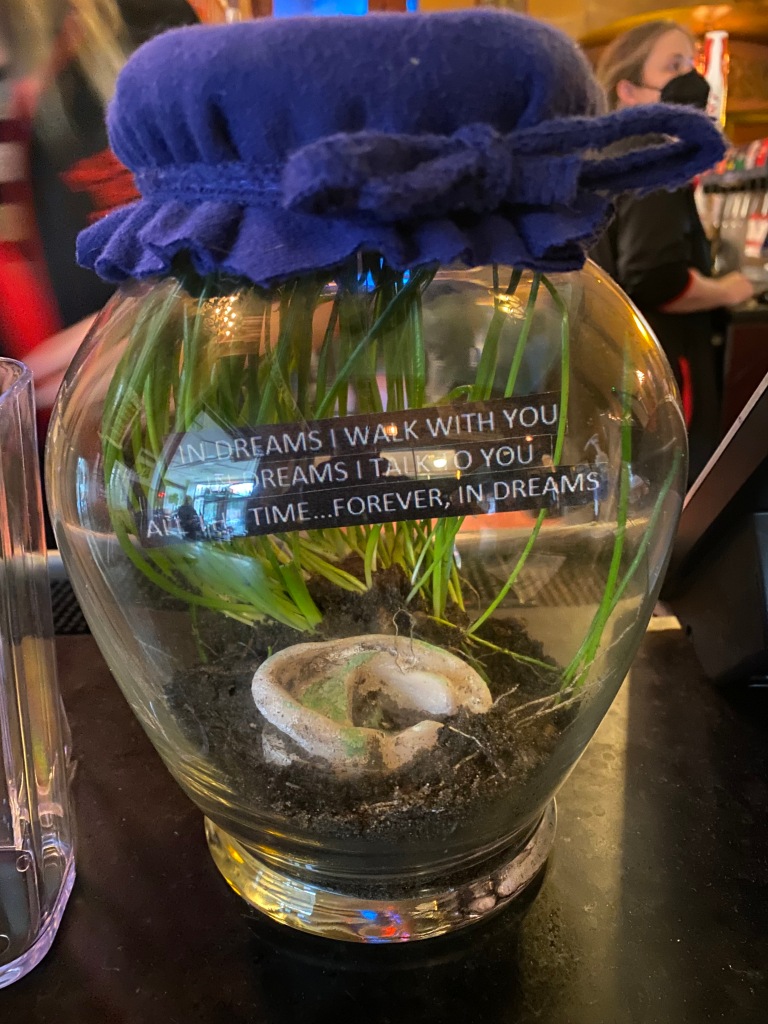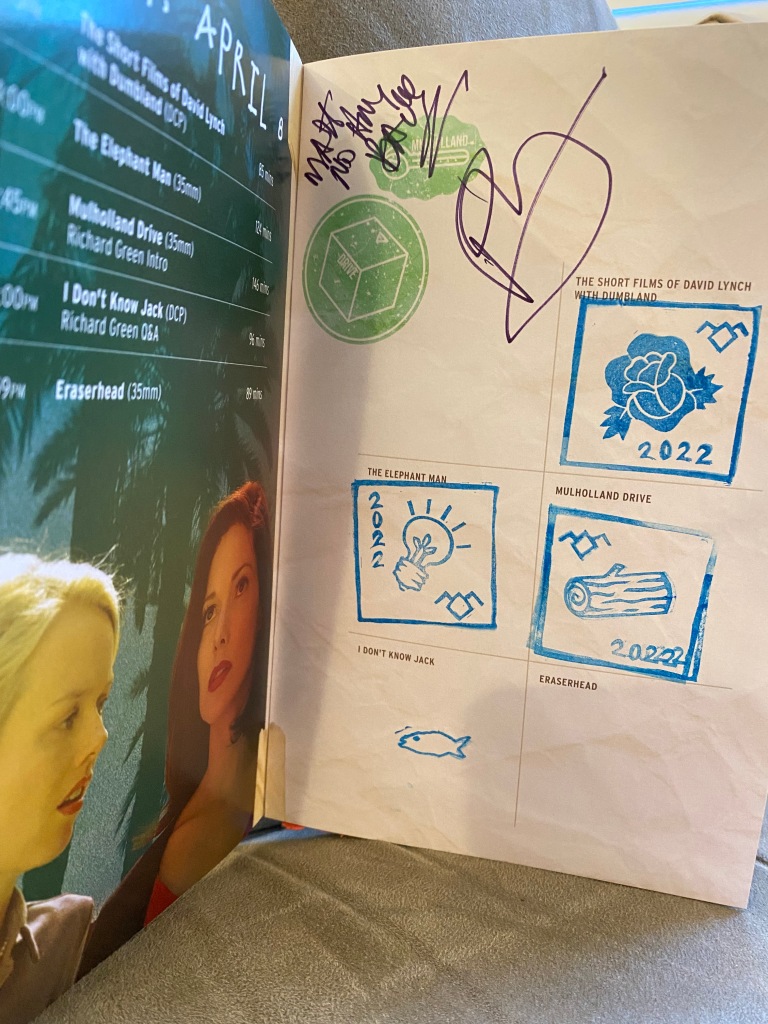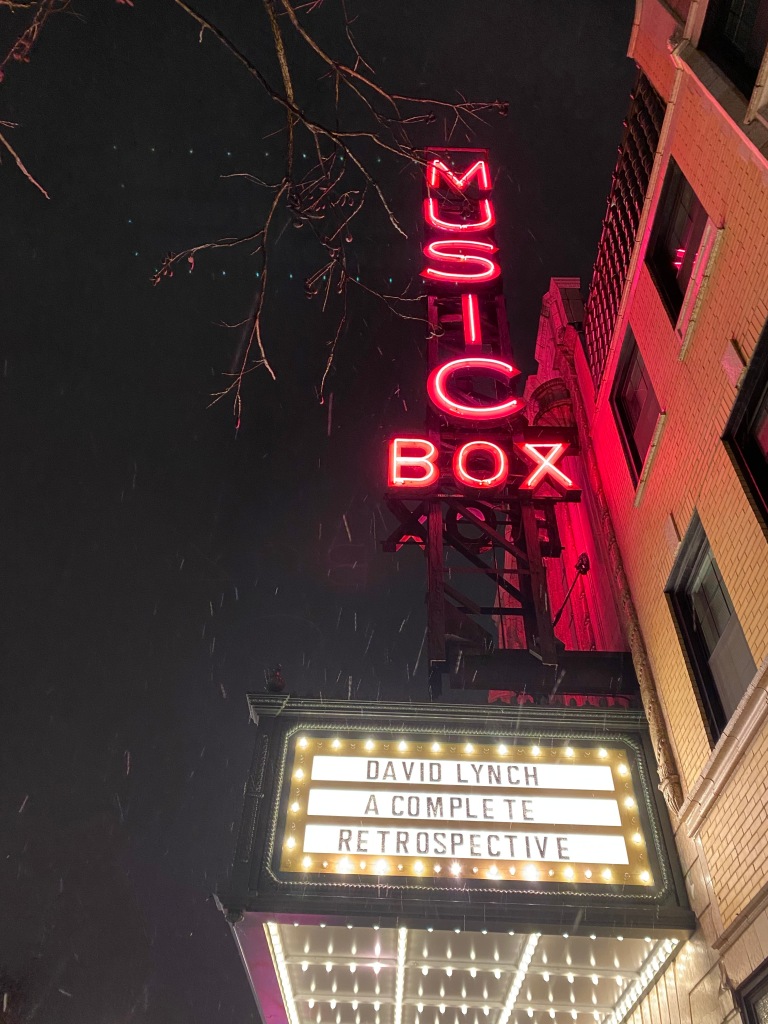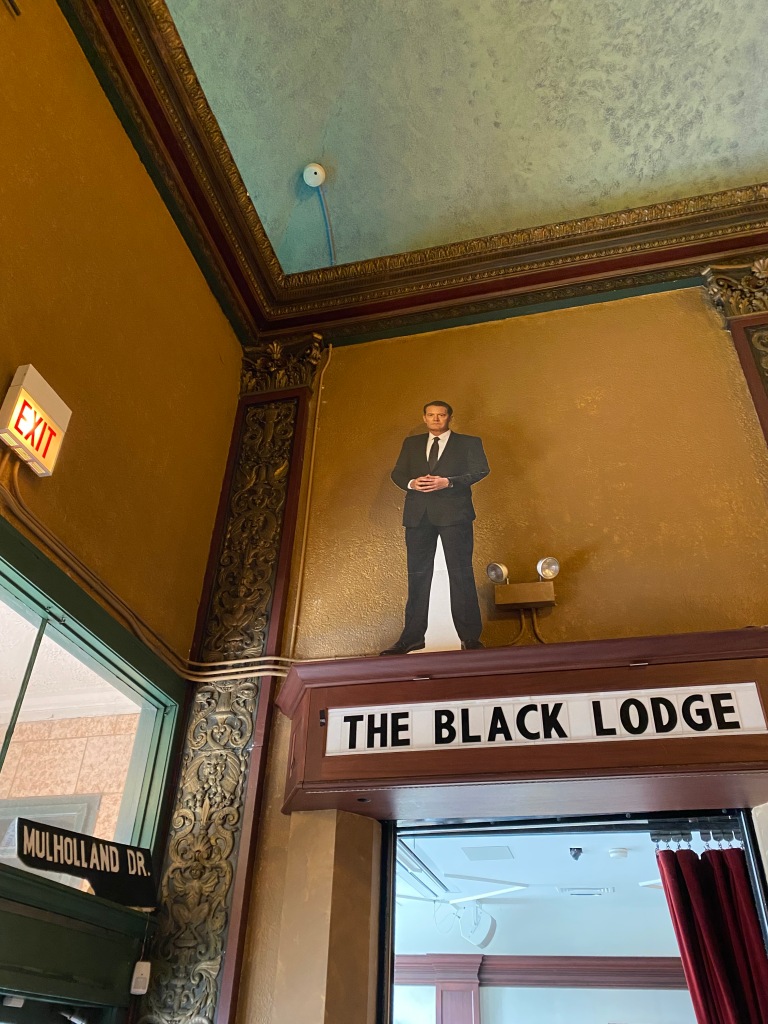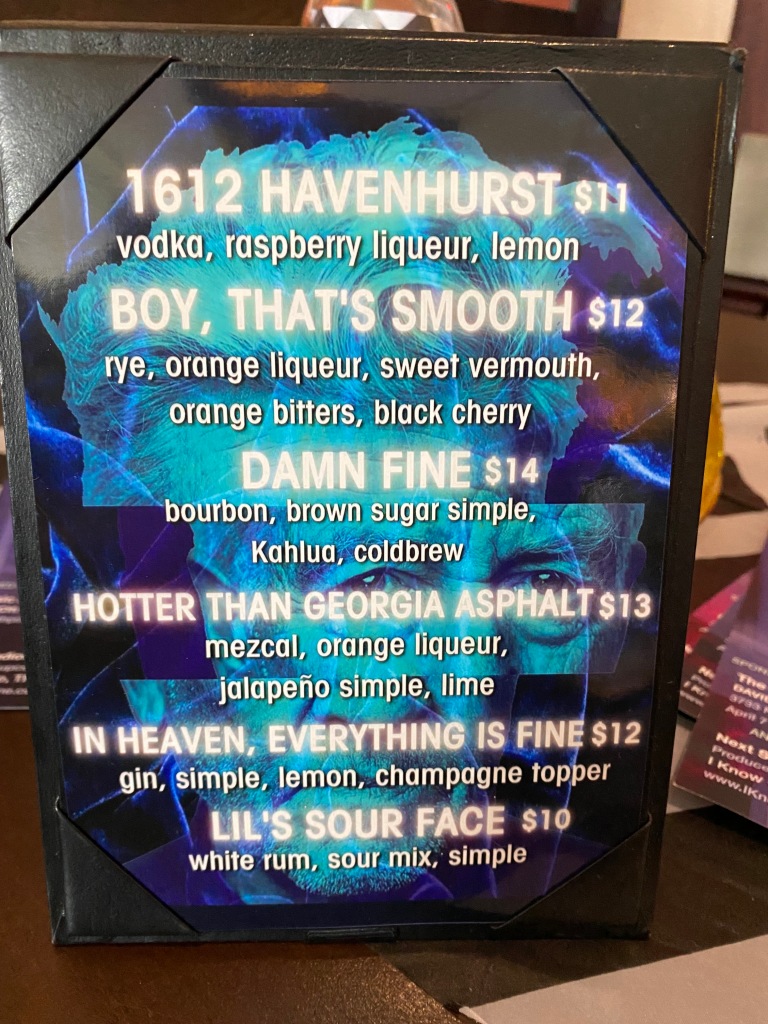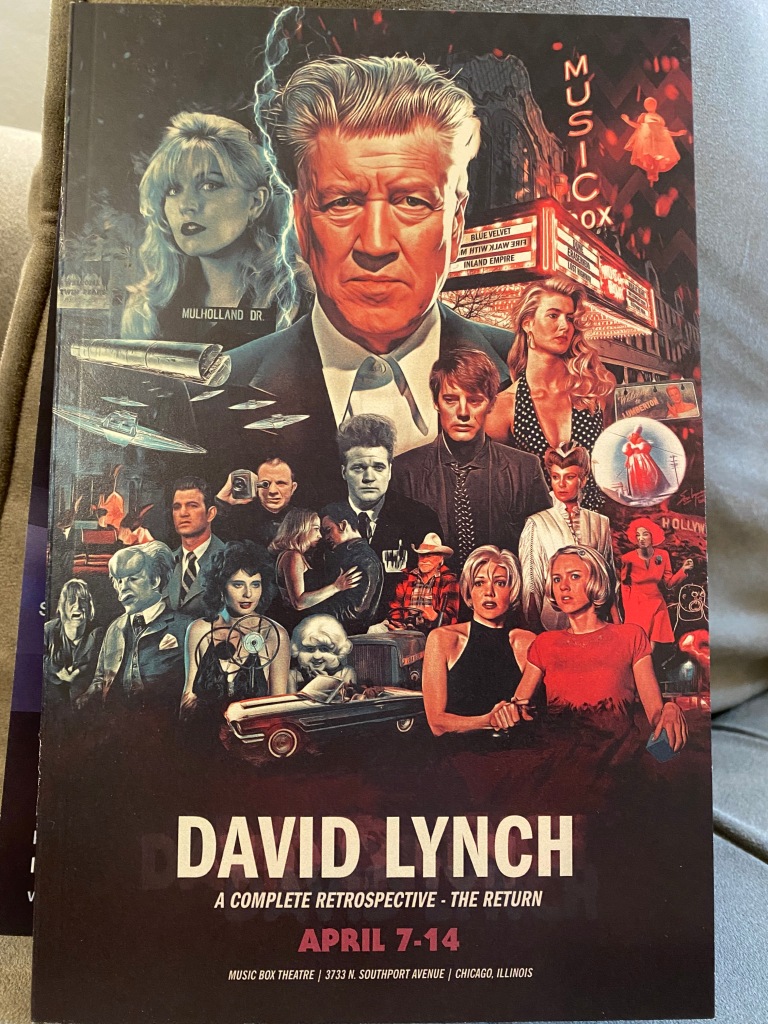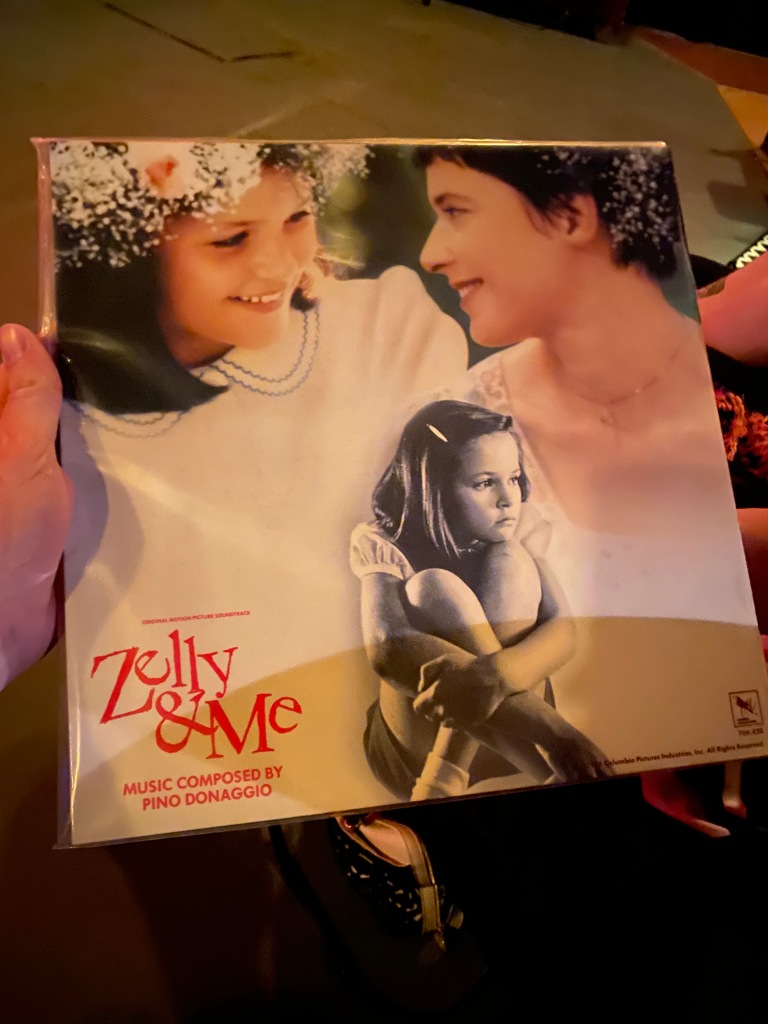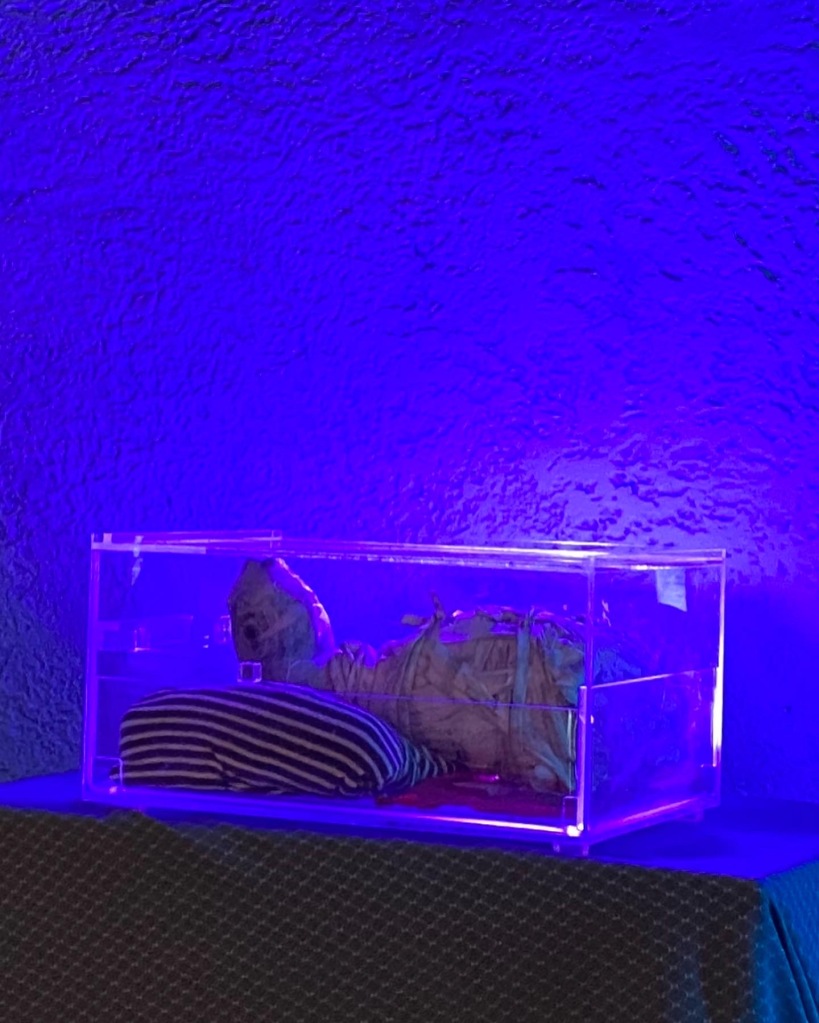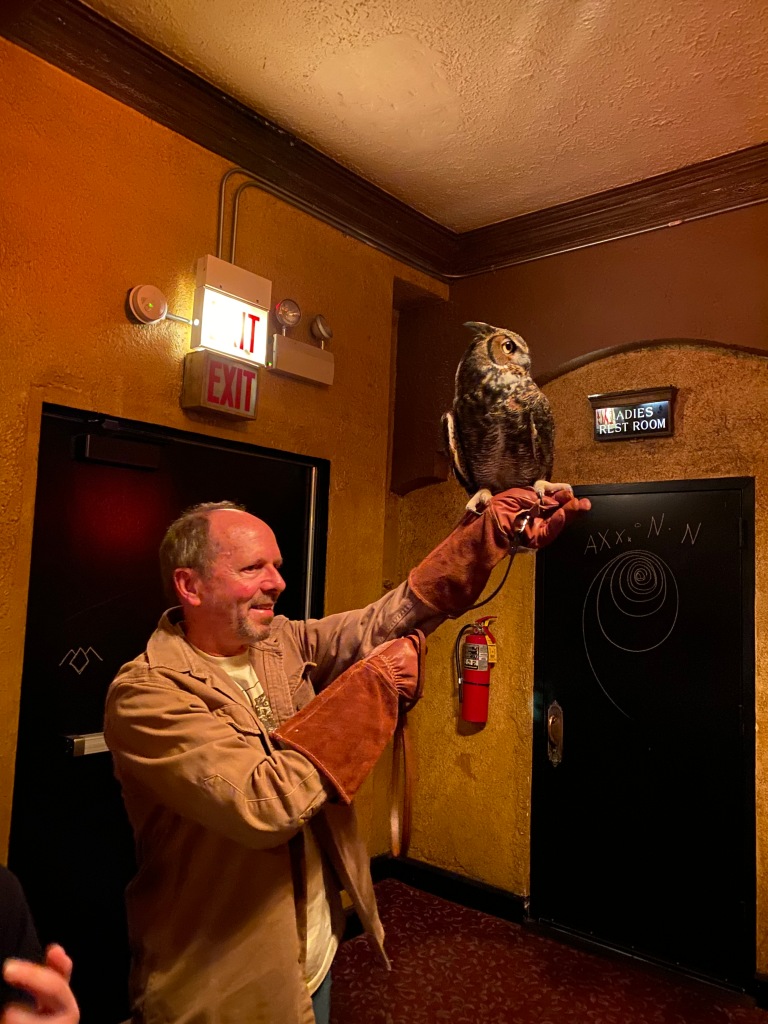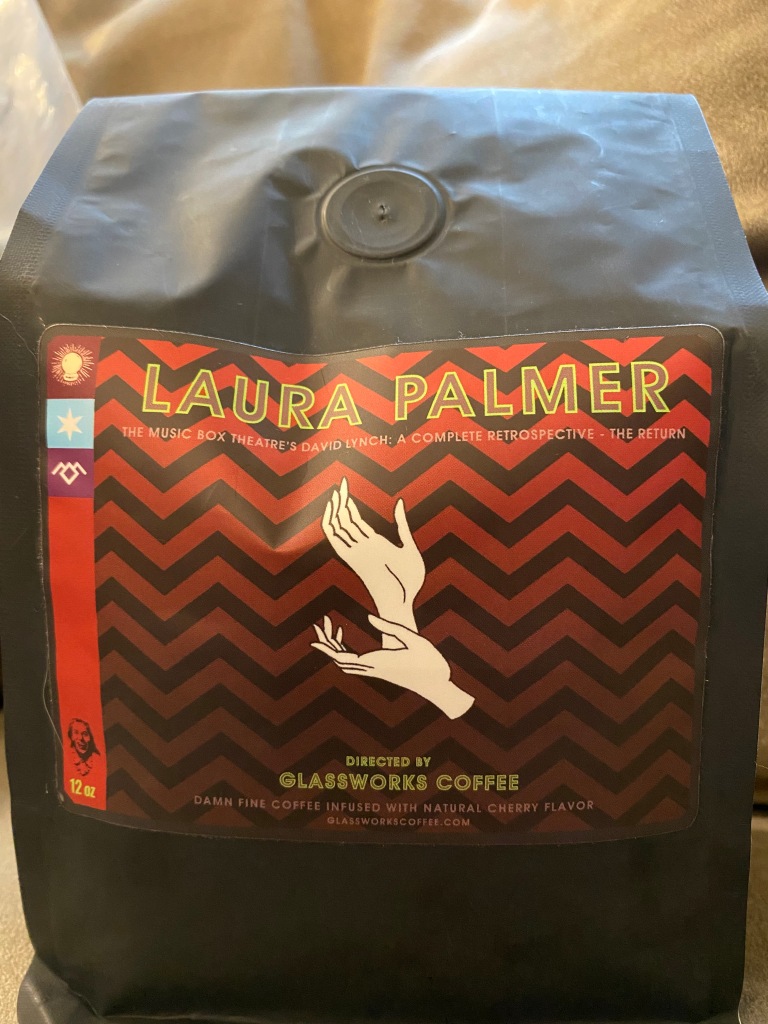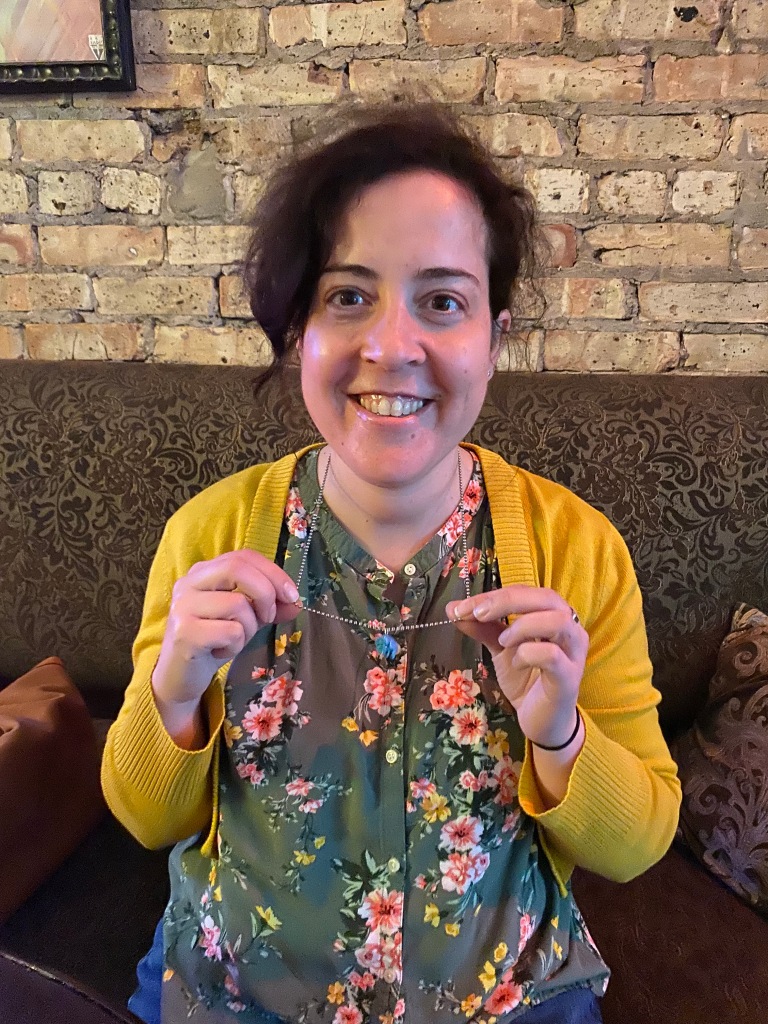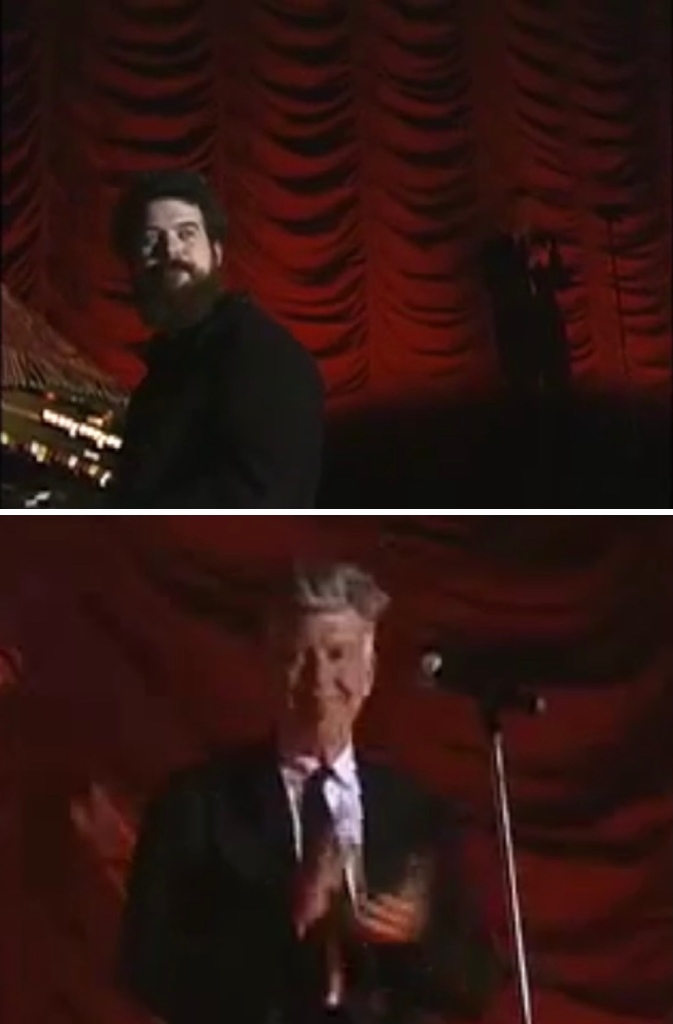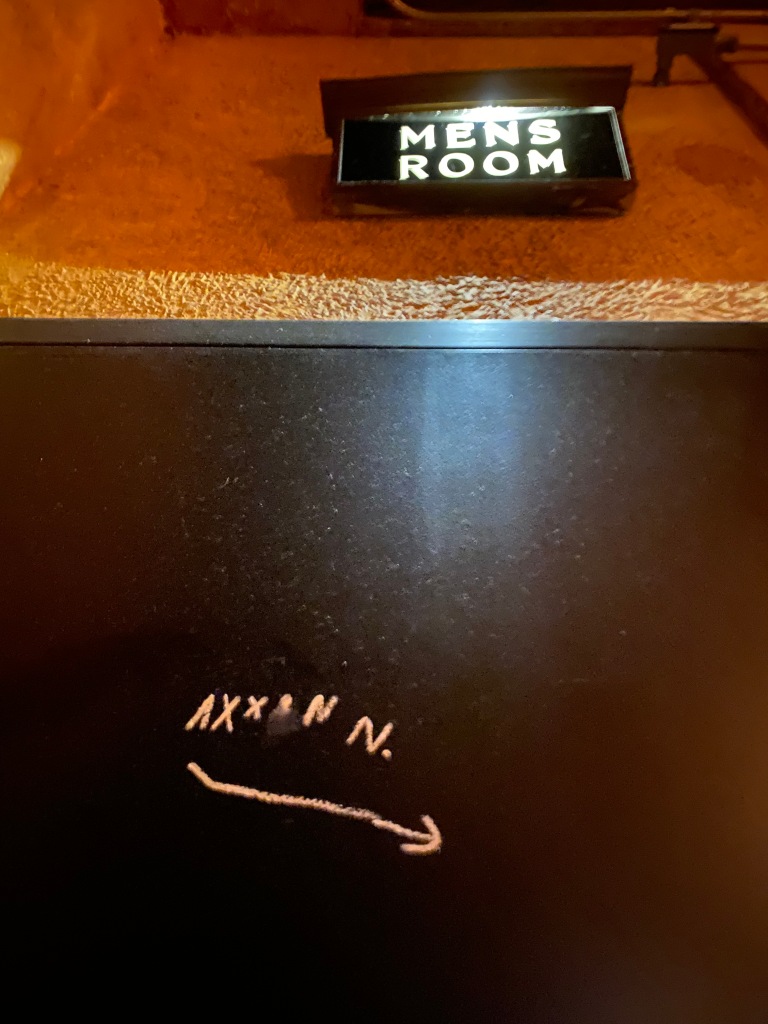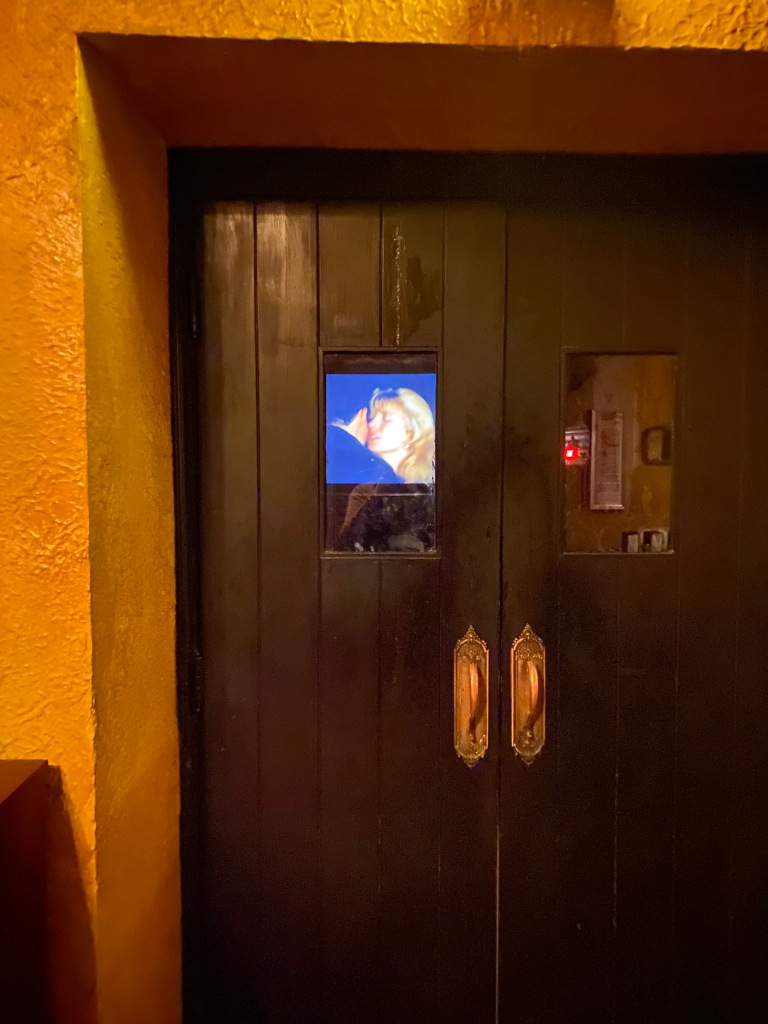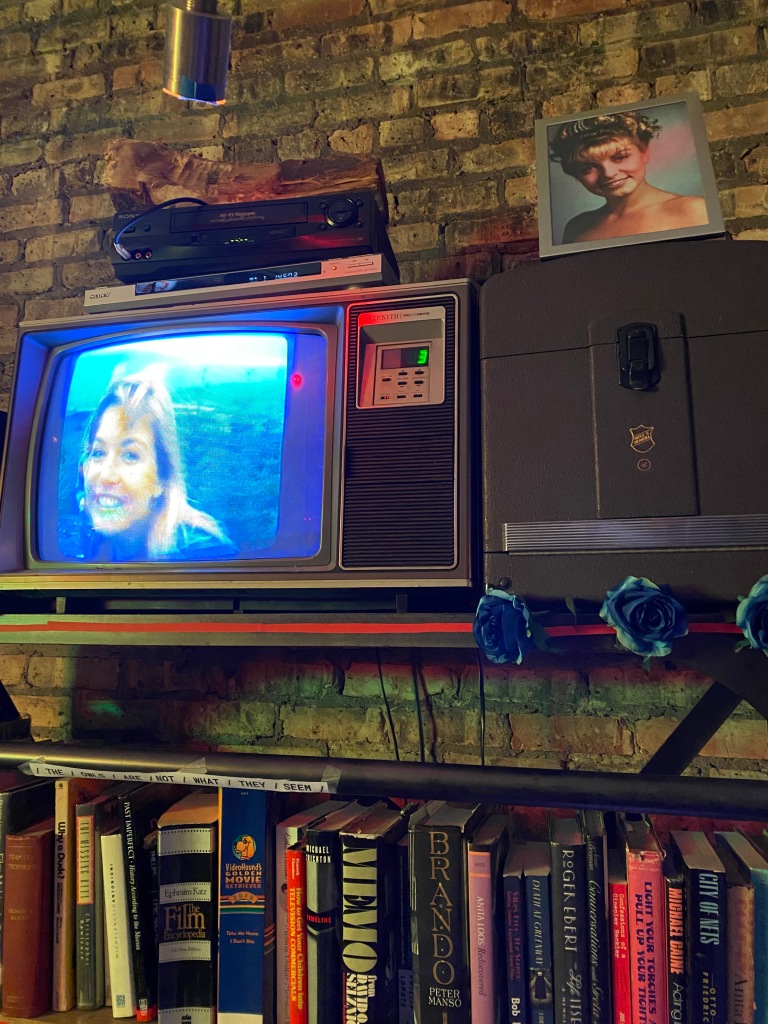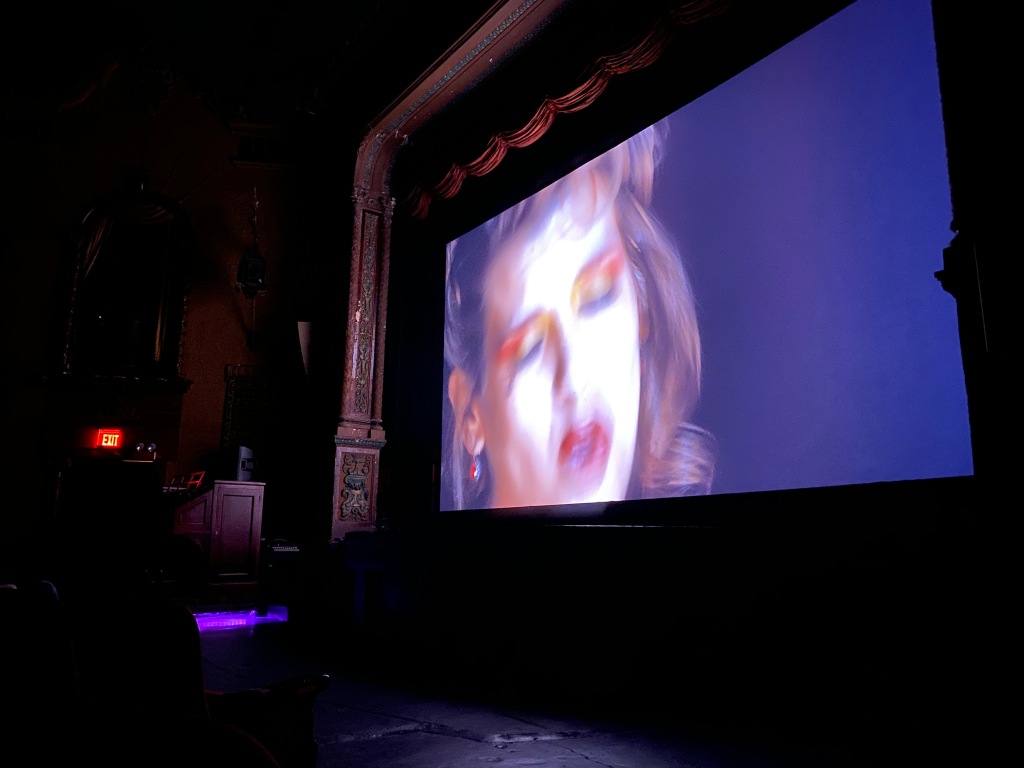
The films of David Lynch have always had a special place in my heart. At age 13, I saw my very first Lynch picture, “The Straight Story,” a movie my family and I absolutely loved. We accompanied each road trip through midwestern cornfields to visit my great uncle—a man who shares Alvin Straight’s indomitable spirit—in Lowpoint, Illinois, with Angelo Badalamenti’s achingly gorgeous score. The next Lynch film I saw, “Mulholland Dr.”, now stands alongside “It’s a Wonderful Life” and “The Shining” as my all-time favorite movie, inspiring me to write my favorite paper in college, “Persona Non Grata: The Persona of 3 Women on Mulholland Dr.” Amidst the tumult of 2017, “Twin Peaks: The Return” was the therapeutic life raft I sorely needed, and when I met the woman who would prove to be the love of my life, Cinema Femme founder Rebecca Martin, I asked her on our first date with the following message: “Let me know if you might be up for grabbing coffee sometime this weekend. Would love to chat more about your magazine—and about ‘Twin Peaks,’ obviously.”
This is why my heart broke when I found myself unable to attend Daniel Knox’s “David Lynch: A Complete Retrospective” at my favorite cinema palace, Chicago’s Music Box Theatre, in 2017. That same week, I was in Toronto covering the Hot Docs film festival, where I interviewed the great comedian Gilbert Gottfried for RogerEbert.com. It made Gottfried’s sudden passing during Knox’s second Lynch retrospective this past week all the more shocking. With my marriage mere months away, I embraced this screening series as my unofficial bachelor party, purchasing a festival pass and inviting dear friends to join me for various screenings. Yet even when I went to the theater on my own, it didn’t take long for the stranger seated next to me to become a new cherished companion. The following photo journal is comprised of my daily dispatches and snapshots posted on my Facebook and Instagram pages, as well as the excellent Facebook group, Lynchland Gang…
April 8th, 2022
Congratulations to Daniel Knox and the Music Box Theatre on last night’s immaculate opening of “David Lynch: A Complete Retrospective—The Return.” It was my first time seeing “Blue Velvet” on the big screen, and the 35mm print attracted an enthused audience that filled the venue (of course, I was one of the first people to arrive, as evidenced by this picture).
In attendance was Duwayne Dunham, the film’s brilliant editor, who shared priceless stories of his collaborations with Lynch. Afterward, I got to shake Dunham’s hand and tell him that “Twin Peaks: The Return,” all eighteen parts of which he edited himself, is a masterpiece (he told me that the job was tantamount to editing nine two-hour movies back to back, and that Lynch had originally intended on there being only nine parts).
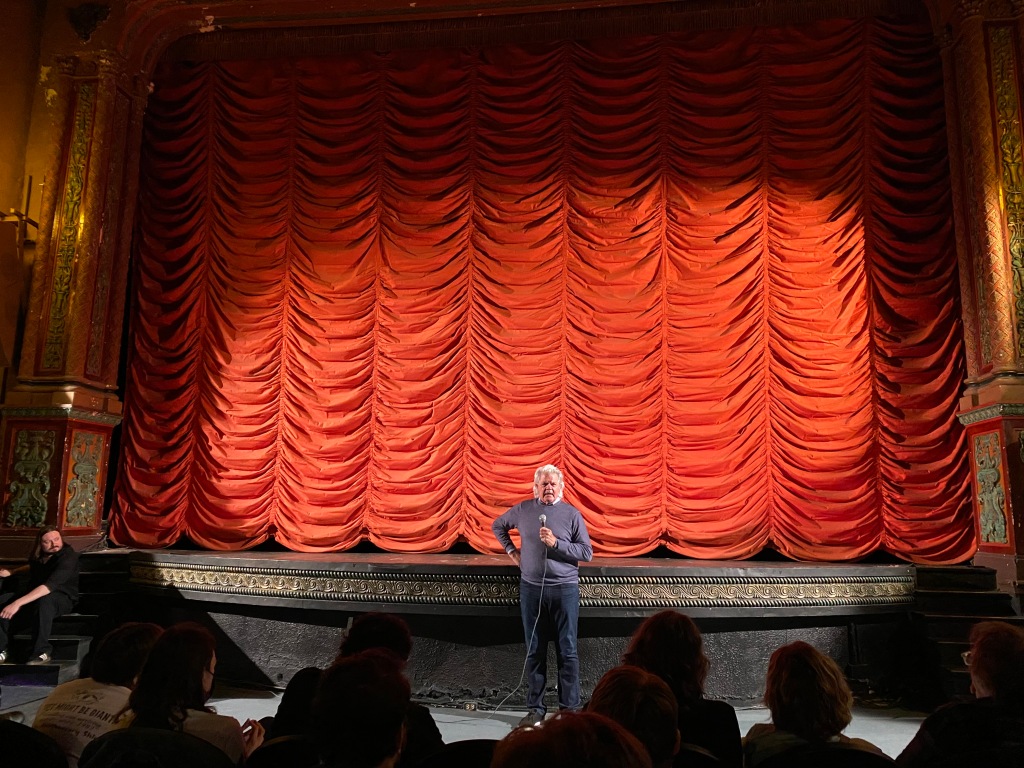
It was a joy to have my fellow Lynch aficionados Michael Smith and Jeff Broitman join me for this screening, which was followed by the documentary “Blue Velvet Revisited” (containing rare behind the scenes footage that shows how intricately involved Lynch was in every aspect of the production, down to the smallest design details) and an astonishing near-hour of deleted scenes that provide invaluable context for MacLachlan’s character, as well as some uproarious opening acts that preceded Isabella Rossellini’s performance at The Slow Club (complete with drums that have written upon them, in big bold letters, the name “BOB”).
Needless to say, I cannot wait to spend the next six evenings at Chicago’s own Club Silencio…
April 9th, 2022
Day 2 of Daniel Knox’s “David Lynch: A Complete Retrospective—The Return” at Chicago’s Music Box Theatre began with a program of the director’s short films, including the masterworks “The Alphabet” and “The Grandmother,” accompanied by all eight episodes of “Dumbland” (my favorite being the finale, where Lynch voices the singing ants). Next up was “The Elephant Man,” the novelization of which I won by correctly answering the trivia question, “What was Mel Brooks’ nickname for Lynch?” (Jimmy Stewart from Mars.) It makes complete sense that Brooks was attracted to Lynch’s work—both men obliterated taboos, and in some ways, “Elephant Man” is a dramatic variation on “Young Frankenstein.”
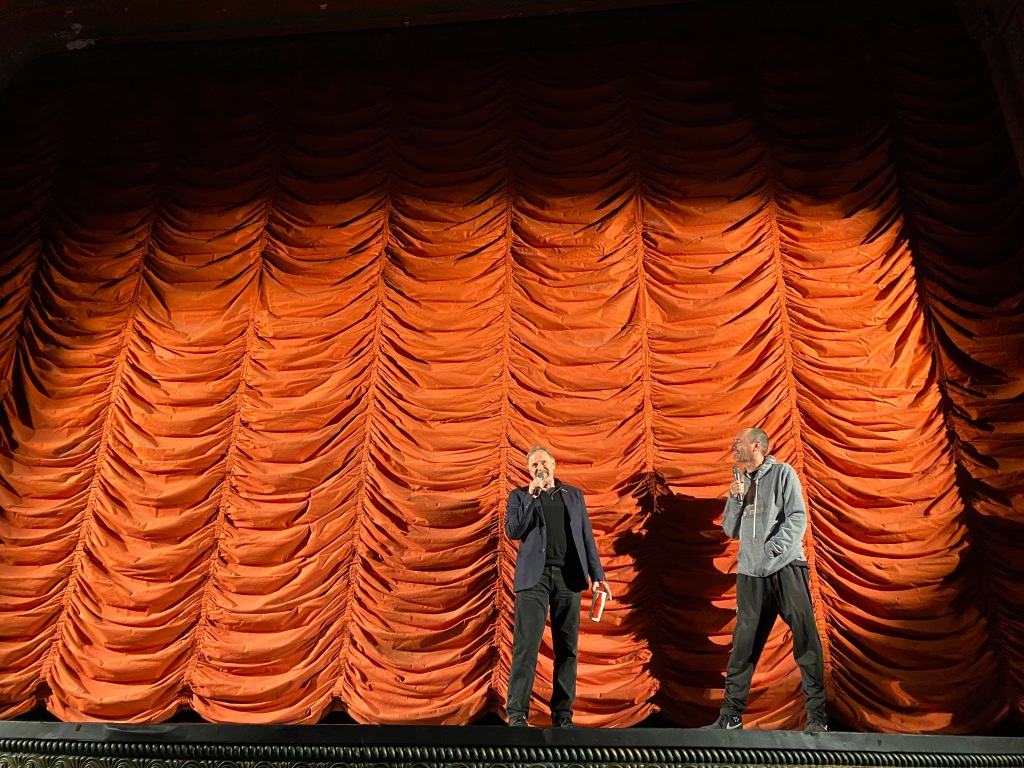
John Hurt’s performance ranks among the greatest in all of cinema, and the same could be said of Naomi Watts in my all-time favorite movie, “Mulholland Dr.” , which screened on 35mm with Richard Green (a.k.a. The Magician) in attendance (my dear friend Jeff York accompanied me for both screenings, and brought along butterscotch peanut butter cups). It was a privilege to stick around afterward for his profoundly emotional Q&A following a screening of Chris Leavens’ 2002 documentary on Jack Nance, “I Don’t Know Jack,” in which Green spoke about his upcoming documentary on Catherine Coulson, “I Know Catherine, The Log Lady.”
I left the venue prior to the midnight screening of “Eraserhead” (which I’m catching on Monday), and saw the line for the film stretching all the way down the block, in the midst of an April blizzard. That indelible image provided further proof that in Lynch’s cinematic heaven, everything is damn fine.
April 10th, 2022
I imagine Barry Gifford and Sherilyn Fenn would’ve appreciated Day 3 of Daniel Knox’s “David Lynch: A Complete Retrospective—The Return” at Chicago’s Music Box Theatre. My day there began with an afternoon screening of the galvanizing “Wild at Heart,” which played to a giddy full house and was preceded by a trailer for director Rob Christopher and producer Michael Smith’s essential documentary, “Roy’s World: Barry Gifford’s Chicago.”
Fenn, who has a heartbreaking cameo in “Wild at Heart,” starred in the next two features of the day: Jennifer Lynch’s criminally underrated directorial debut, “Boxing Helena,” and Alien Castle’s thoroughly entertaining “Desire and Hell at Sunset Motel,” both of which were shown on rare prints. David Hewlett walks away with the latter picture as Beat poet Deadpan, whose spontaneous performance designed to intimidate a vexing hula hooper brought down the house.
After grabbing a Damn Fine drink from the Lynchian bar, I settled in for the remainder of the night’s programming, which lasted until the early morning hours: a compilation of Lynch’s commercials and music videos (my favorite being Donovan’s hallucinogenic “Gimme Some A That”); the haunting “Wild at Heart” companion piece, “Industrial Symphony No. 1,” featuring Julee Cruise; the first episode of Lynch and Gifford’s fascinating series, “Hotel Room,” starring Harry Dean Stanton; and the majority of deleted scenes from “Wild at Heart,” ending with Dern and Cage’s impressions of Lucy and Ricky Ricardo. Now THAT would make for an interesting Lucy/Desi biopic…
April 11th, 2022
Day 4 was by far my most emotional of Daniel Knox’s “David Lynch: A Complete Retrospective—The Return” at Chicago’s Music Box Theatre. My Sunday there began with Jon Nguyen, Rick Barnes and Olivia Neergaard-Holm’s illuminating documentary, “David Lynch: The Art Life,” in which the director finds himself overcome with emotion upon recounting a painful childhood memory.
Next up was my most anticipated rare screening of the retrospective: “Zelly & Me,” a 1988 drama directed by Tina Rathborne, who helmed two episodes of “Twin Peaks.” In her taped intro to the film, recorded especially for this festival, Rathborne recalled how a test audience became so upset with the picture that they voiced their desire to kill whoever made it. Like Anjelica Huston’s “Bastard Out of Carolina,” this film boldly explores a young woman’s wrenching coming of age in a way that defies Hollywood convention, and as a result, has been rendered almost impossible to find. Alexandra Johnes, executive producer of such A-grade indies as “The Witch,” is wonderful as the young heroine. Glynis Johns, the delightful mother from “Mary Poppins,” chillingly portrays the Nurse Ratched of grandmothers, while the chemistry between Isabella Rossellini and David Lynch (so disarmingly sensitive as her smitten flame), echoing their offscreen relationship, is off-the-charts. Here’s hoping this film one day receives the release it deserves (the woman seated next to me won Pino Donaggio’s soundtrack on vinyl, one of many priceless giveaways from Knox).
Along with “Mulholland Dr.”, “The Straight Story” has a permanent place on my list of all-time favorite films, and finally getting to see it on the big screen last evening was a glorious experience. It was the last film of its star Richard Farnsworth (who died a mere year after its release) and its cinematographer Freddie Francis, and what they achieve here never ceases to leave me in awe. Preceding “Zelly & Me” was a montage of Lynch’s other acting roles, including his poignant monologue in John Carroll Lynch’s “Lucky,” a film that makes a fitting double bill with “Straight Story,” since it provides an equally meaningful showcase for Farnsworth’s co-star, Harry Dean Stanton, who passed away just days before the film’s release. Rounding out this perfect day at the movies was the Alicia Witt double bill of “Dune,” followed by the actress’s tour de force performance opposite Crispin Glover in “Blackout,” the Barry Gifford-scripted third episode of Lynch’s “Hotel Room” series (my dear friend Jeff Broitman accompanied me for both).
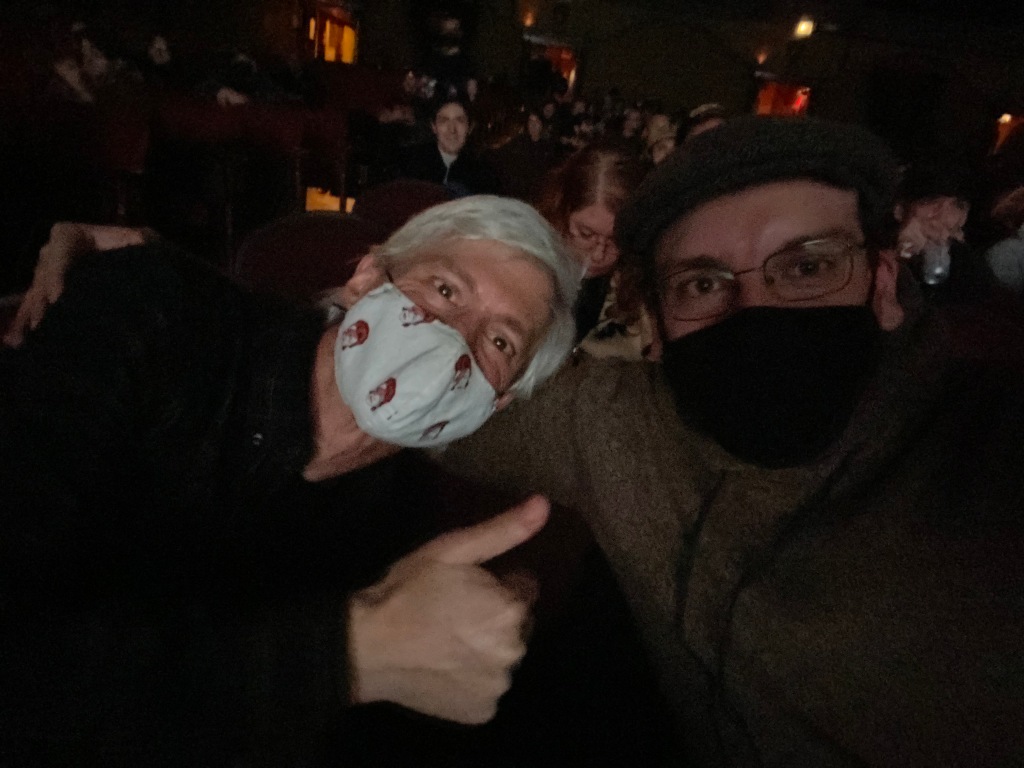
When I spoke with Gifford last year, he told me that “Blackout” has been performed as a play around the world ever since. “I was on the set every day for the filming of those two episodes, and when I saw Alicia, she just looked like a little girl,” he told me. “Then I saw her perform, and she was brilliant. I’m glad that she’s gone on to have a real career. I also liked the fact that the characters were younger because it caused the loss of their child to be so fresh in their minds. So many women have come and spoken to me about that play.”
April 12th, 2022
There are certain benefits to showing up early for Daniel Knox’s “David Lynch: A Complete Retrospective—The Return” at Chicago’s Music Box Theatre. No sooner had I shown up for Day 5 than I found myself having a lovely one-on-one conversation with the legendary Charlotte Stewart, a.k.a. Mary X in “Eraserhead” and Betty Briggs in “Twin Peaks.” She told me how the baby in “Eraserhead” was wholly real to her when she performed opposite it, and how Lynch directed her to tug at her suitcase—which was stuck under the bed—12 or 13 times, resulting in one of the film’s most indelibly odd images.
Then I settled in for a preshow comprised of Lynch’s quinoa cooking lesson (my favorite extra on the “Inland Empire” DVD), in which he tells a story involving “frog moths,” a creature strikingly similar to the one in Episode 8 of “The Return.” Gwen, the fellow Lynch enthusiast seated next to me, danced in her chair throughout the entirety of “Duran Duran: Unstaged” (and seriously, how could you not?). Following that was a sold out screening of “Eraserhead,” accompanied by a wonderful Q&A with Stewart moderated by Scott Ryan of The Blue Rose Magazine.
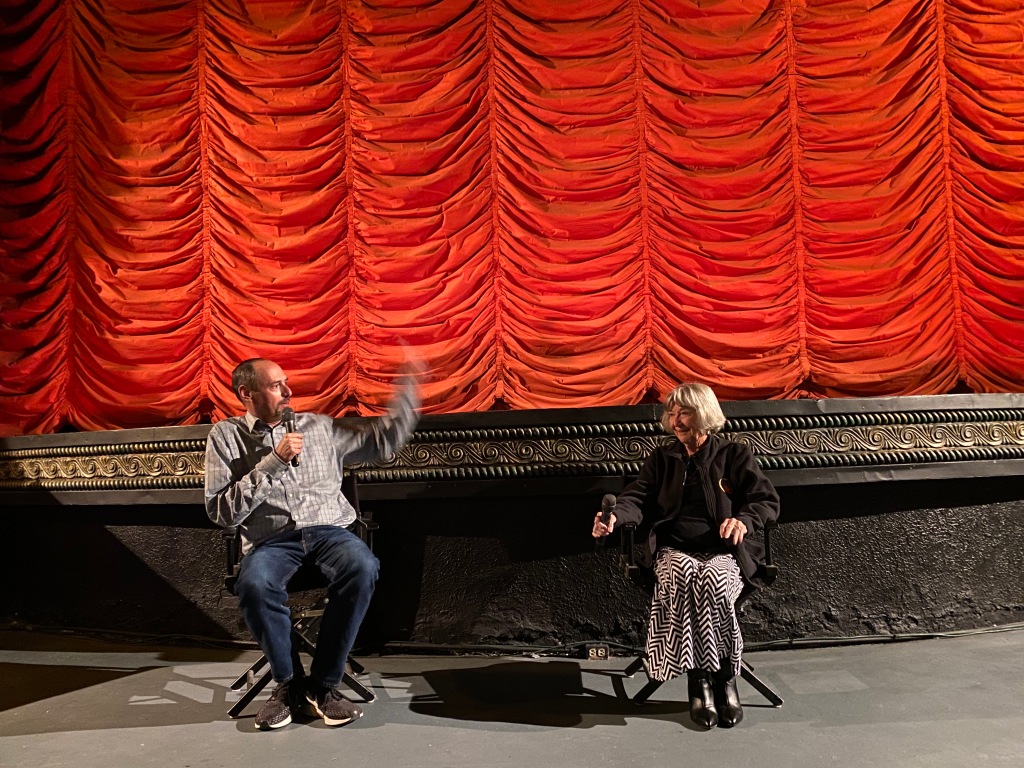
She was clearly moved by the love she was shown from the crowd, and was delighted to share her memories of Elvis Presley, Jim Morrison and Jack Nance, leading her to observe, “I’m so f—king grateful!” The subsequent standing ovation she received inspired her to take an impromptu photo with the audience (on the ground, you can spot the “Eraserhead” photo she autographed for me).
The evening concluded with the ever-haunting “Lost Highway,” the uproarious pilot for Lynch and Mark Frost’s short-lived sitcom, “On the Air,” and a stunning montage of 16mm footage shot by the filmmaker in his youth and set to the music of Penderecki.
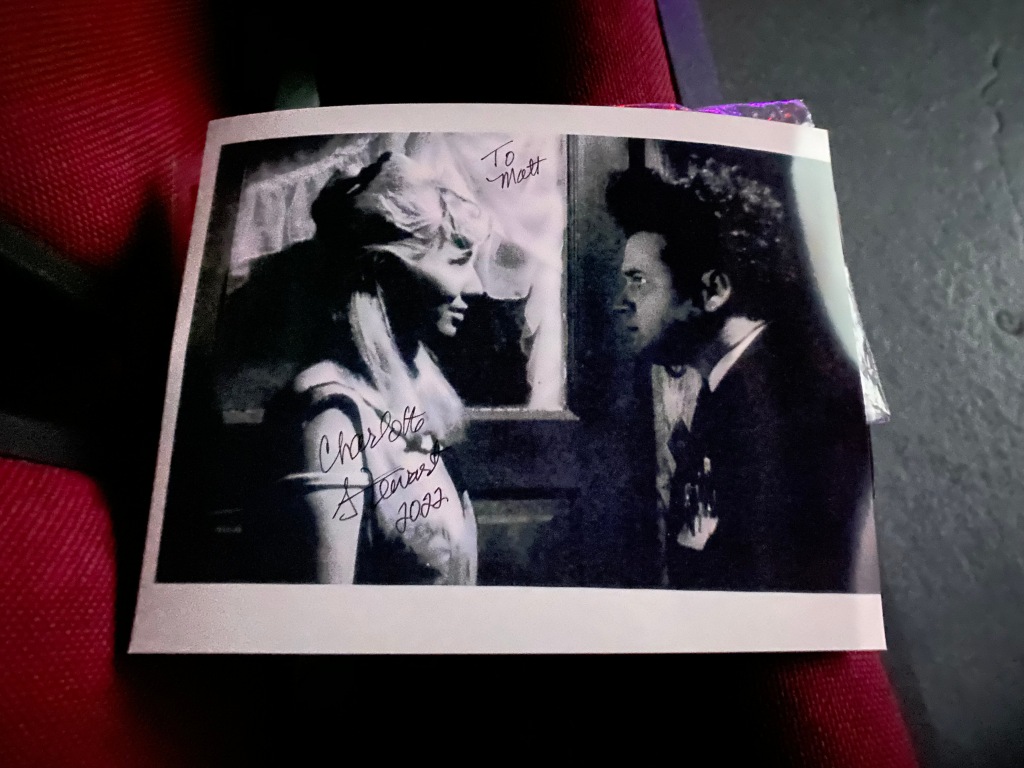
April 13th, 2022
Not only did Charlotte Stewart stick around for Day 6 of Daniel Knox’s “David Lynch: A Complete Retrospective—The Return” at Chicago’s Music Box Theatre, but audience members attending the evening’s much-anticipated “Twin Peaks” Celebration were greeted by a gorgeous owl. And in this case, the owl IS what it seemed.
Preceding this was a free screening of the lovely 2012 documentary, “Meditation, Creativity, Peace,” which follows Lynch as he journeys through 16 countries to discuss transcendental meditation. Heavenly cherry pie from Bang Bang Pie Shop (no relation to the Bang Bang Bar) and Glassworks Coffee’s damn fine cherry-infused Laura Palmer roast were on sale prior to the sold out screening of “Twin Peaks: Fire Walk With Me,” with its towering performance from Sheryl Lee.
Most of the crowd stayed late to see “Twin Peaks: The Missing Pieces” on the big screen, followed by Part 8 of “Twin Peaks: The Return,” the most astonishing hour in one of the great cinematic achievements of my lifetime. Best of all, my fiancée Rebecca Martin accompanied me for the first two films of the day, and was gifted with a Blue Rose necklace from a fellow pass holder who crossed paths with us. She’s one of the many friends we’ve spontaneously made during these precious days, a key reason for why this retrospective is a gift that will keep on giving.
April 14th, 2022
In January of 2007, David Lynch presented the Chicago premiere of “Inland Empire” at the Music Box Theatre, which was preceded by a magnificent mood-setting piece of music composed and performed on the organ by Daniel Knox (you can see Lynch applauding him here).
I was lucky enough to attend that screening fifteen years ago, and it made Day 7 of Knox’s “David Lynch: A Complete Retrospective—The Return” a truly glorious full circle experience. The entire evening was devoted to “Inland Empire,” starting with the illuminating documentary “Lynch: One,” which shows the director riddled with self-doubt as he searches the Bible (as he did on “Eraserhead”) to find the connecting thread that will join the disparate elements of his surrealist epic. My dear friend Michael Smith (who recently directed “Twin Peaks” star Wendy Robie in his own film, “Relative”) joined me for the much-anticipated 4K restoration of “Inland Empire,” which played to a full house that gave the film multiple ovations during its exhilarating finale. Rather than provide the visuals with unneeded crispness, the restoration gives each frame the look of a painting, while making visible key details that were impossible to see on the murky DVD.
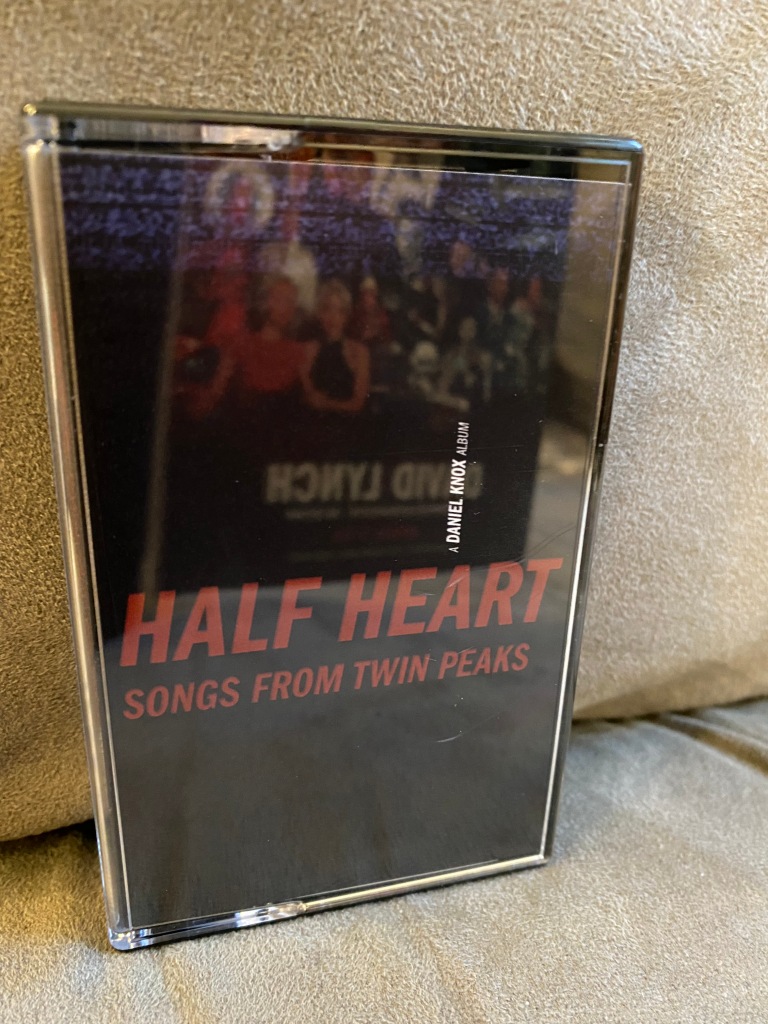
Laura Dern’s performance is one of the most astounding I’ve seen, and Knox preceded the feature with the priceless YouTube video, “Nate & Matt meet David Lynch (and a cow),” which shows Lynch’s unconventional method for running an Oscar campaign. He sits on a corner in Hollywood next to a giant “For Your Consideration” sign displaying Dern, and standing next to him is a real cow, along with another sign reading, “Without Cheese, There Wouldn’t Be an ‘Inland Empire.’” When asked what the latter sign means, he cheerfully explains, “Cheese is made from milk!” The night concluded with a fascinating collection of deleted scenes, the documentary “Lynch: Two” and every episode of “Rabbits.” By the time I left the venue, the temperature had plunged from 70 degrees to the frigid 30s—indicating that I may have suddenly gotten teleported to Poland.
The longer one spends time during the day in Lynch’s cinema, the more one’s life outside the theater feels like a dream. And as Lynch noted, quoting the Upanishads at the film’s premiere, “We are like the spider. We weave our life and then move along in it. We are like the dreamer who dreams and then lives in the dream. This is true for the entire universe.”
April 15th, 2022
Last night, Daniel Knox’s “David Lynch: A Complete Retrospective—The Return” came to a close at Chicago’s Music Box Theatre. I spent most of the evening in the lobby and the lounge, savoring my conversations with the lovely people I’ve met during this soul-cleansing week at the cinema.
I was so happy to be in the packed house for the last film of the day—“Twin Peaks: Fire Walk With Me”—when Scott Ryan, the wonderful editor of The Blue Rose Magazine, encouraged the crowd to give Knox the standing ovation he richly deserved. I told Knox that what he’s created with this retrospective is as powerful a communal experience and creatively reinvigorating retreat as Ebertfest, the festival founded by Roger Ebert at his alma mater, the University of Illinois.
Both Ebert and Knox are gifted at fostering the sort of engaged moviegoing that makes audiences open to immersing themselves in challenging and revelatory cinematic works. There are countless moments from the past eight days that will remain forever etched in my memory. I’ll never forget how the venue’s Lynchian red curtain fell over the sleeping girl at the end of Part 8 in “Twin Peaks: The Return,” a stunning image captured here by Brett Stephan.
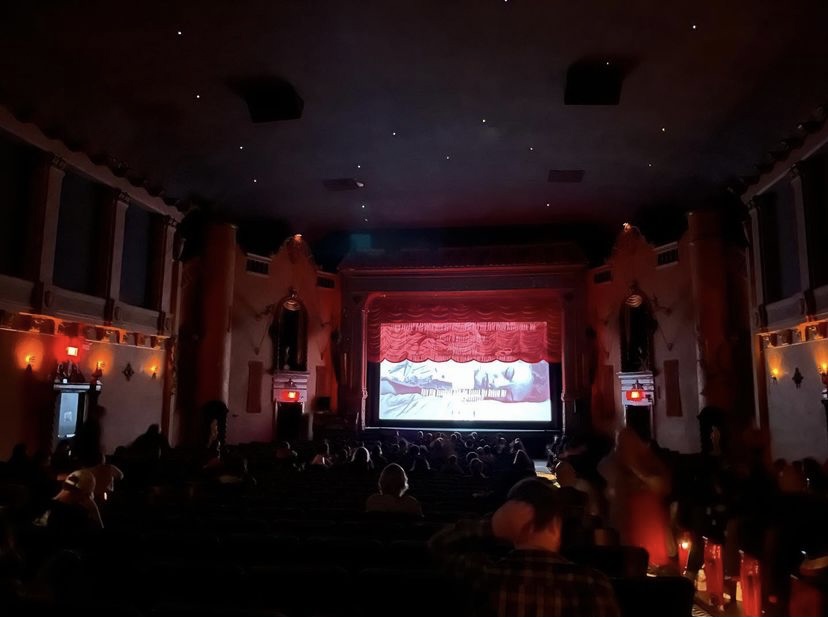
I’ll never forget the young man, Trevor Slavin, who hopped upon the stage just before “Lost Highway” screened. He was wearing a T-shirt displaying Lynch’s infamous “Two Thumbs Down” ad, and announced, “This is my favorite movie of all time!” The response he received from the crowd affirmed that he wasn’t alone.
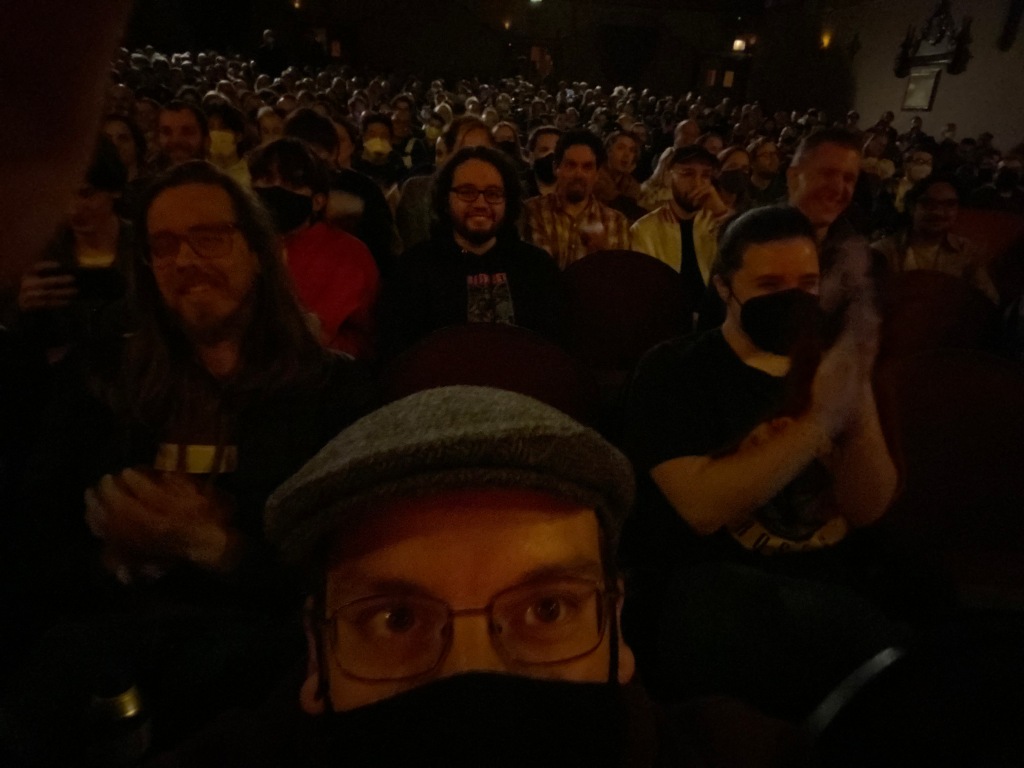
When I recounted this story to the film’s co-writer Barry Gifford, he replied, “Thanks Matt. Nice that ‘Lost Highway’ has such ardent partisans. Your photo of the crowd is great!” (see above) And I’ll never forget the very last screening of the retrospective—the game-changing pilot of “Twin Peaks”—which was a thrill to view on the big screen.
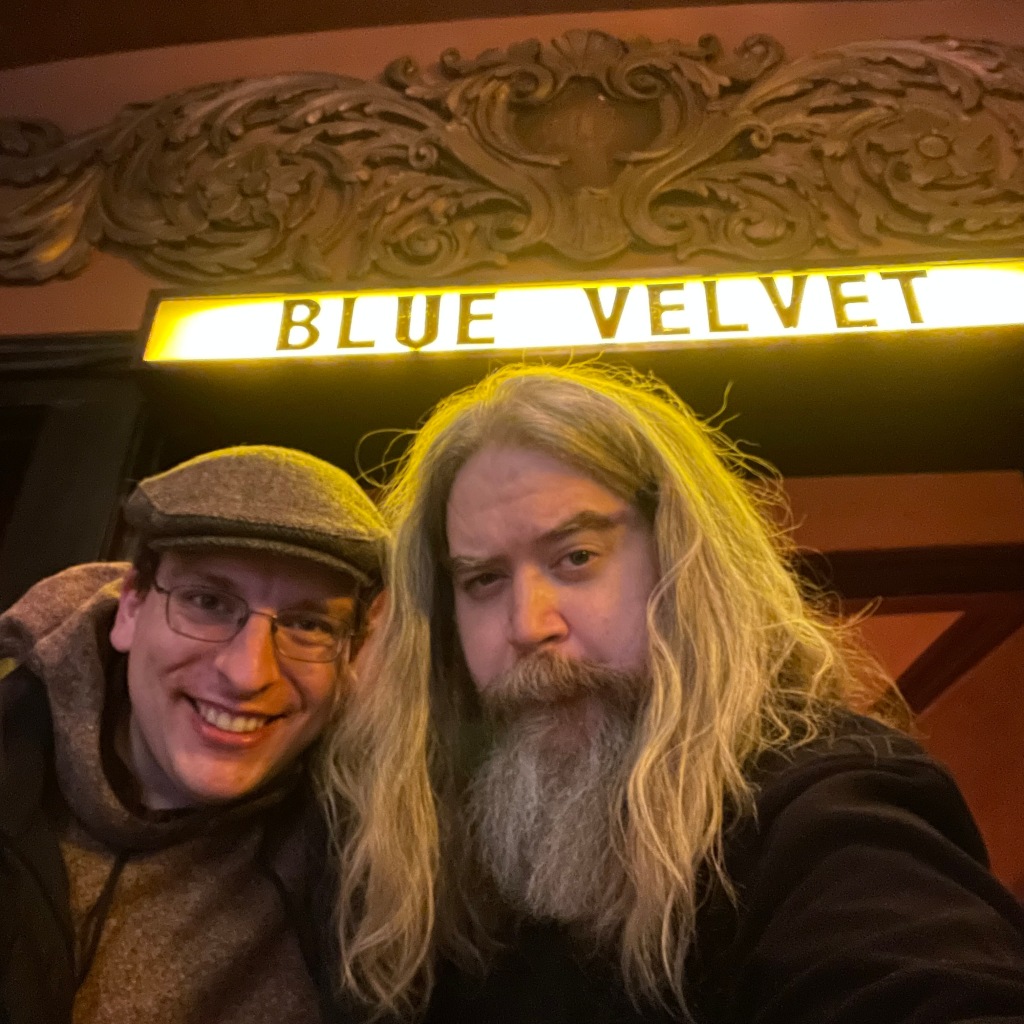
Afterward, I gave Knox a hug and thanked him for making possible what has surely been one of the best weeks of my life. And judging from all my encounters with the beautiful souls at this retrospective, there are a great many others who feel the same way.
To read my interview with Daniel Knox, click here.
